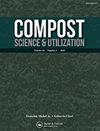施用蚯蚓堆肥减轻钠对土壤理化性质的不利影响
IF 0.9
4区 农林科学
Q3 ECOLOGY
引用次数: 12
摘要
摘要本研究旨在研究蚯蚓堆肥(VC)作为土壤调理剂对钠盐侵蚀土壤中钠的影响。因此,研究了VC对降低钠盐对土壤理化性质的不利影响的作用。实验采用不同剂量的VC(0、2.5和5% VC (w/w))和3种不同钠盐水平(0、4和8 dS m−1 NaCl)进行。不同盐度胁迫下蚯蚓堆肥处理对土壤理化性质均有显著的正向影响。蚯蚓堆肥也降低了盐渍土壤的交换性钠。不同钠盐制度下蚯蚓堆肥处理提高了土壤有机质、速效磷、全氮、速效钾和阳离子交换能力。低钠和中钠水平(NaCl浓度分别为0和4 dS m−1)下的VC处理提高了土壤EC值。然而,在高钠盐胁迫(8 dS m−1 NaCl浓度)下,蚯蚓堆肥处理降低了EC值,从而降低了土壤盐度。不同钠盐水平下蚯蚓堆肥处理提高了土壤的田间容量、有效水量、饱和导水率、总孔隙度、团聚体稳定性,降低了土壤容重。结果表明,蚯蚓堆肥处理,特别是5% VC处理,在缓解盐渍化的不利影响和提高土壤质量方面效果显著。综上所述,蚯蚓堆肥处理可作为一种有效的改良材料用于钠盐侵蚀土壤的复垦。本文章由计算机程序翻译,如有差异,请以英文原文为准。
Alleviation of Adverse Effects of Sodium on Soil Physicochemical Properties by Application of Vermicompost
Abstract The objective of this study was to examine the influence of vermicompost (VC) as a soil conditioner in alleviating adverse effects of sodium in Na salt-effected soils. Therefore, the role of VC for reducing the adverse effects of Na salt on physicochemical properties of soil was investigated. Experiments were conducted with different doses of VC (0, 2.5 and 5% VC (w/w) and three different Na salt levels (0, 4 and 8 dS m−1 NaCl). Vermicompost treatments under different salinity stress levels had significant positive effects on soil physicochemical properties. Vermicompost also decreased exchangeable Na of salt-affected soils. Vermicompost treatments under different Na salt regimes enhanced soil organic matter, available phosphorus, total nitrogen, available K and cation exchange capacity of the soils. VC treatments under the low and medium Na salt levels (0 and 4 dS m−1 NaCl concentration, respectively) increased soil EC values. However, vermicompost treatments under high Na salt stress (8 dS m−1 NaCl concentration) decreased EC values, thus soil salinity. Vermicompost treatments under different Na salt regimes increased field capacity, available water capacity, saturated hydraulic conductivity, total porosity, aggregate stability and decreased bulk density of the soils. Present findings revealed that vermicompost treatments, especially 5% VC treatments were quite effecient in alleviating adverse effects of salinity and enhancing soil quality. It was concluded based on present findings that vermicompost treatments could be considered as an efficient amelioration material for reclamation of Na salt-effected soils.
求助全文
通过发布文献求助,成功后即可免费获取论文全文。
去求助
来源期刊

Compost Science & Utilization
农林科学-生态学
CiteScore
4.10
自引率
0.00%
发文量
0
审稿时长
>36 weeks
期刊介绍:
4 issues per year
Compost Science & Utilization is currently abstracted/indexed in: CABI Agriculture & Environment Abstracts, CSA Biotechnology and Environmental Engineering Abstracts, EBSCOhost Abstracts, Elsevier Compendex and GEOBASE Abstracts, PubMed, ProQuest Science Abstracts, and Thomson Reuters Biological Abstracts and Science Citation Index
 求助内容:
求助内容: 应助结果提醒方式:
应助结果提醒方式:


